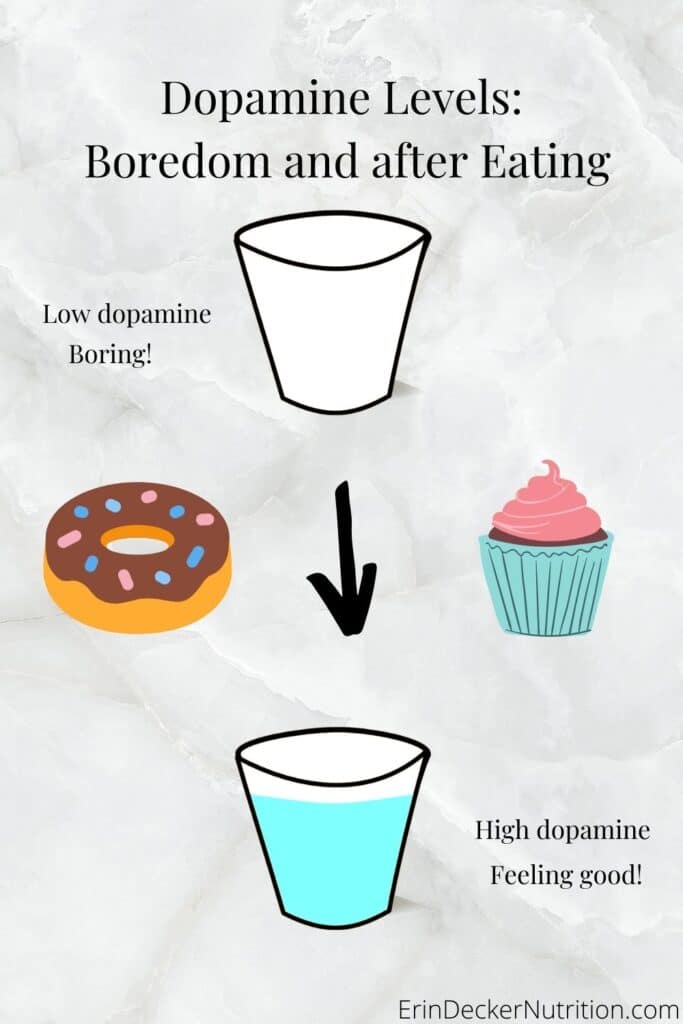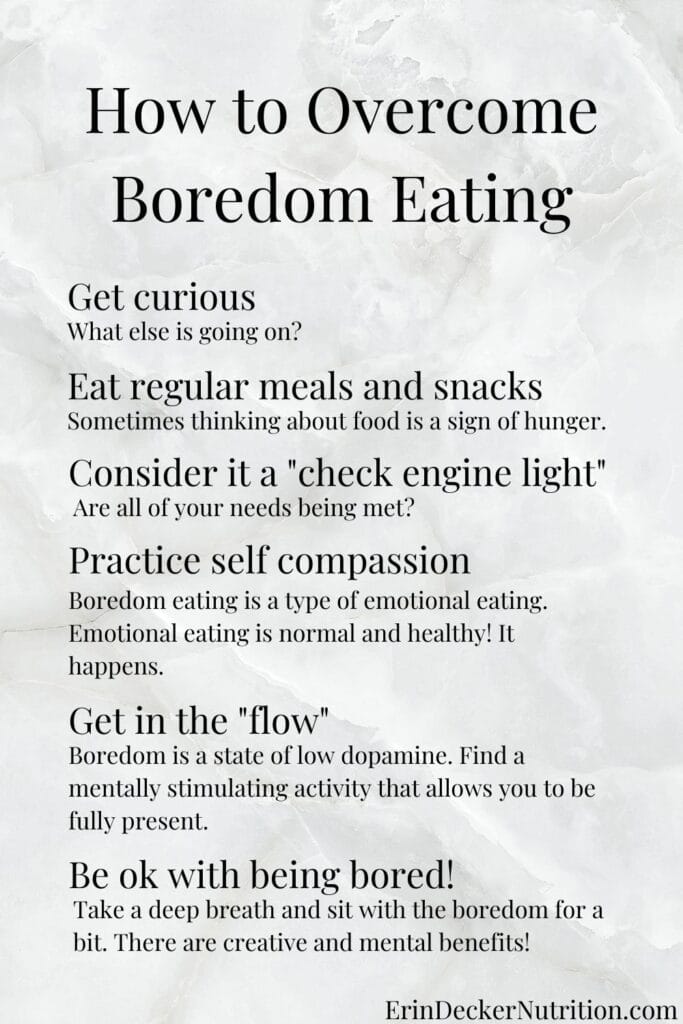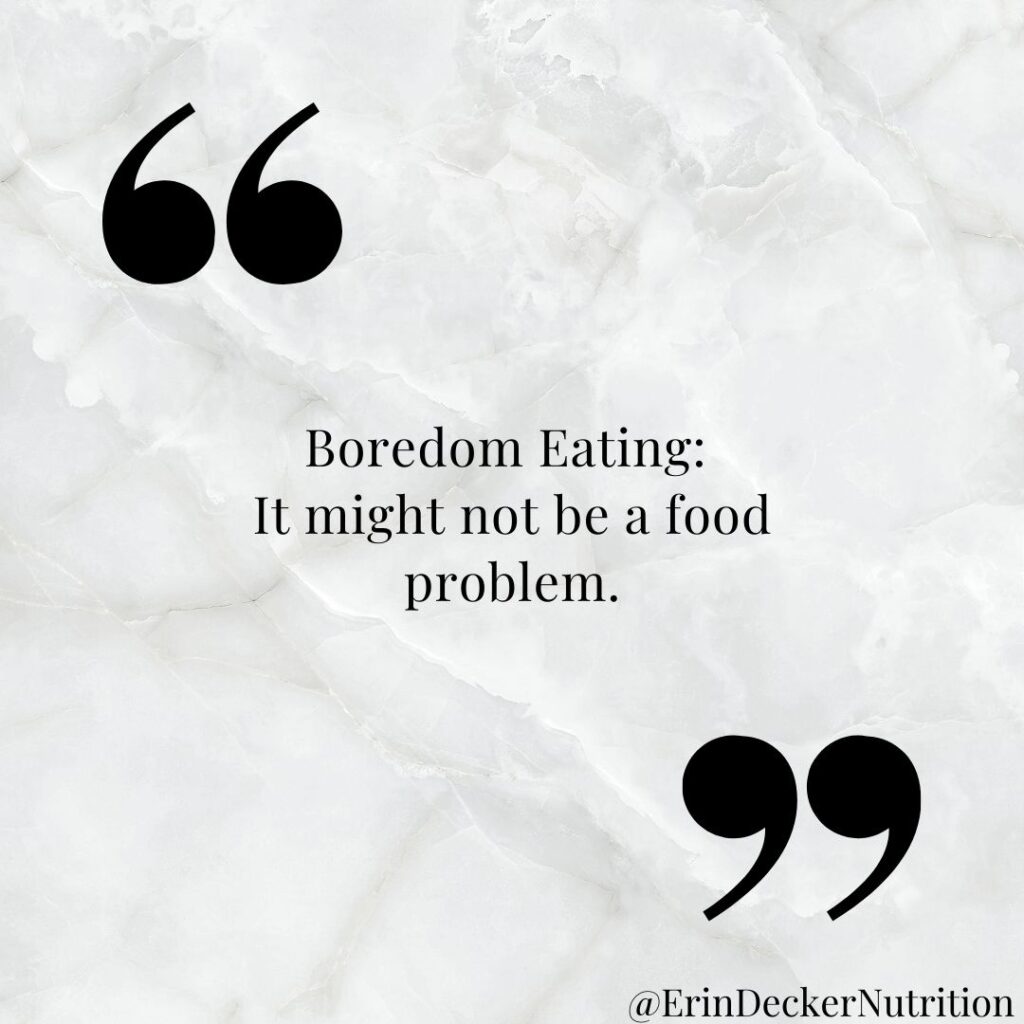I just eat when I’m bored! She told me. I need to distract myself. There are so many other tasks I could do. There are dishes to wash, laundry to fold, work to do. I just don’t want to do any of those. I can’t stop thinking about food.
I’ve been there myself too. As a mom and business owner, there’s always something I could be doing. Calling insurance companies, researching childcare, walking the dogs, doing blog research… But none of it is as attractive as a cup of coffee and a few cookies, right?!
I don’t know anyone who hasn’t fallen into the trap of boredom eating at some point. Especially if you work from home – the pantry is just a few steps away!
So how do you overcome boredom eating? Before exploring the options, let’s first investigate: what causes us to turn to food when bored?
Why do we eat when we’re bored?
Boredom is a state of dopamine depletion. Dopamine is a neurotransmitter involved in a number of body processes, particularly reward and motivation. When we experience something pleasurable or rewarding, our dopamine levels increase. High dopamine levels feel good, so we want to continue doing the thing that caused them to rise.
Boredom is associated with low dopamine levels. Therefore, anything we do to increase dopamine is going to be more attractive. Eating is one activity that can increase dopamine, especially if it is a tasty treat and/or something we don’t typically have.

A note on food addiction:
Earlier studies suggested that sugar can be “as addicting as cocaine” because of this dopamine production. From an evolutionary perspective this makes sense: if we are in a state of starvation, we want eating to be attractive and addictive, if you will.
However, I have worked with many clients who thought they were addicted to food, but when they started eating adequate calories, their “addictions” disappeared. This is consistent with what researchers of a 2016 review conclude: there is no evidence to support sugar addiction in humans.
The difference between stomach hunger and head hunger
Stomach hunger is when we need to eat for physiological reasons, and head hunger is when we want to eat for emotional or psychological reasons. Boredom eating falls into the “head hunger” category.
Diet culture says you should not listen to head hunger. However, I believe honoring all types of hunger, whether it is stomach or head hunger, is important. When we don’t honor head hunger or consider what we are craving, it becomes a “forbidden fruit”. It’s suddenly all we can think about. Studies on reward deficiency support this phenomenon.
Couple that forbidden fruit mentality with calorie restriction, and you have a perfect storm for dopamine to spike and leave you feeling out of control around tasty treats.
How to Stop Eating When Bored
First and foremost, I don’t think we need to 100% avoid eating when bored. I would classify it as a type of emotional eating. Emotional eating is ok and can fit in with other healthy coping mechanisms.
However, if you’re reading this, you probably have some distress around your boredom eating. See below for some strategies to assess and ultimately overcome your boredom eating!

Get curious about the boredom eating
First we want to think about what the motivation for eating is and if it actually is boredom. To do this, think about when your eating occurs. Try to do so with non-judgmental curiosity.
For example:
- Are you anxious about something coming up?
- Are you procrastinating another activity, such as a work or school task?
- Is it possible you are actually hungry?
- Have you eaten adequately throughout the day?
- Consider your feelings toward boredom eating and the food available. Are you tempted by “forbidden foods” or have negative feelings toward eating in general?
- Are you looking for a mental “break”? For many of my clients, eating offers a justifiable reason (to them) to take a break.
Eat regular meals and snacks
It is SO important to make sure that you are eating regular meals and snacks when assessing your eating behaviors. If you are not eating at least three balanced meals and snacks, there is a chance you are actually hungry and not just bored. One of the first signs of hunger is thinking about food.
Use boredom eating as a “check engine light”
When you catch yourself eating, think of it as a check engine light. It’s not necessarily a problem. Use it as an opportunity to pause and see if your needs are being met. It’s ok to eat while bored, but is it what you want to use the time for?
Practice self compassion
Try to tease out your feelings on boredom eating. Do you feel guilty about it? Or do you think you should try to distract yourself with something else? This is a great opportunity to practice self-compassion, or give yourself grace.
Remember, boredom is a state of low dopamine. So chances are eating, especially in a state of calorie deficit, is going to be more attractive than any other activity you come up with. This is just reality – it is not a failure on your part. Everyone gets bored at times.
Get in the “flow”
Many tips for avoiding boredom eating suggest finding another activity to distract yourself. This is a fine strategy. However, remember that not just any activity is going to be rewarding enough to distract you. You’re up against the strong dopamine hit. What you want to find is an activity that gets you in a state of flow.
A flow state is one that is fully immersive and allows you to be 100% present. Your mind is not wandering. Examples include playing a sport, completing a puzzle, writing, or painting. Basically, anything that challenges you mentally, requires concentration, and leaves little room for wondering what’s in your fridge.
Be ok with being bored.
With today’s technology, we never have to be bored. There is always something new to read, another dopamine hit in the form of a like or comment, and another email to respond to. We never need to sit alone with our thoughts.
However, embracing boredom may come with several benefits. These benefits range from improving mental health to boosting creativity.
Turning to food when bored is totally normal and understandable. It is also frustrating. However, I don’t think it is really a “food problem” to solve. Rather, I think it’s an opportunity to practice some mindfulness and sitting with your thoughts.

Instead of reaching for your phone or a snack, try closing your eyes and sitting in silence. Consider meditating for a few moments and letting your mind wander. You never know what you might come up with!
Have you experienced boredom eating? How did you overcome it? Let me know!

Boredom eating is more common than people think. When one doesn’t have something to focus on or be preoccupied by, it’s easy to just resort to eating. Good insight on the topic at hand!